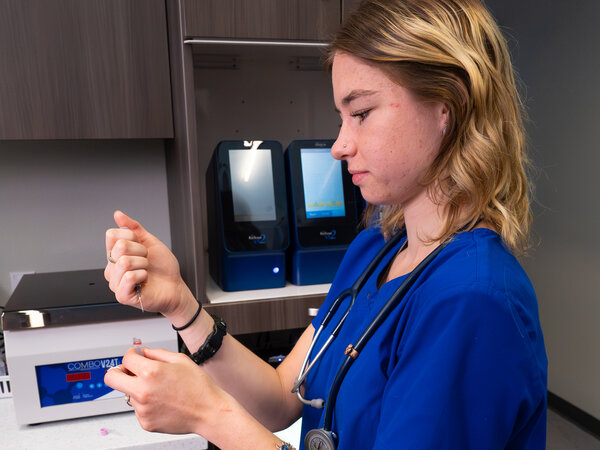Diagnostic tools provided at our emergency animal hospital
The Pet Emergency Center team offers a wide array of in-house diagnostic services for your pet.
Why does my pet need diagnostic tests?
The best way to analyze your pet's health is a physical exam and standard diagnostic tests. Diagnostic tests ensure your pet is stable and does need emergency medical or surgical intervention.
Physical exam
The oldest and most basic diagnostic test is the physical examination. Although we have many advanced tests to offer, we rely heavily on our experience and a physical exam.
Blood tests
Some health data can be gathered by analyzing your dog's or cat's blood. Complete Blood Counts (CBCs) let us track your pet's white blood cell count, red blood cell count, and platelet levels. We will also check that your pet's blood cells are shaped correctly and functioning properly. Blood tests can also tell us about your pet's immune system and oxygen levels. Chemistry panel blood tests analyze kidney as well as liver function, blood protein levels, blood sugar levels, electrolytes and more.
We carry blood tests for heartworm and tick disease screening, feline leukemia and feline immunodeficiency virus, canine and feline pancreatitis, antifreeze ingestion, mouse or rat bait ingestion, ketosis, blood lactate levels, and more.
Blood typing and blood transfusion tests
We carry tests for blood transfusions such as blood typing kits and crossmatch kits. These tests help us screen our blood donors and blood recipients to make sure we have a match and avoid potentially serious blood transfusion reactions. Dogs have two major blood types with multiple subtypes while cats have three major blood types.
Urinalysis
Many pet diseases are easily detected in urine samples. Examples of such diseases include diabetes mellitus and bladder infections. We recommend a urinalysis test if your pet is experiencing any changes/abnormalities in urination or water consumption. We recommend collecting and bringing a urine sample with you to save time.
Fecal exams
Fecal examinations can help us understand your pet's current health and detects any intestinal diseases or parasite infections. The presence of mucus or blood in the fecal sample is a clear sign of a health problem. Once this is detected our veterinarians can initiate treatment to help your pet. If you notice any abnormalities with the stool we recommend that you bring a fecal sample with you so that it can be analyzed.
Ultrasounds and X-Rays
We may recommend x-ray and ultrasound tests to fully understand your pet's condition. We use ultrasound waves to create real-time images of the animal's body part, showing tissues and organs in detail. We also use x-rays to check for bone or other internal injuries. Both x-rays and ultrasound tests are noninvasive and safe methods for checking your pet's health.
Endoscopy
When a pet swallows a dangerous object like a fish hook, battery, rock, or just about anything you can think of, surgical removal is often necessary. However, some objects can be removed via endoscopy which will allow for a faster recovery time with no surgery to recover from. Endoscopy is also helpful when removing objects from hard to reach places such as the esophagus.
Eye tests
Eyes are sensitive organs and require specialized tests. We utilize fluorescein stain to check eyes for corneal abrasions, lacerations or scratches. The Schemer Tear Test checks tear production and identifies conditions that lead to red, irritated eyes from a lack of tear production. Checking intraocular pressure of the eyes helps rule out glaucoma - a serious increase in internal eye pressure that leads to blindness.
Once we determine the diagnostic tests your pet needs, we will provide an estimate of the costs. You make the final decision as to which diagnostics will be performed on your pet.
If your pet needs emergency services, we are here to help. Call or text (406) 829-9300.



